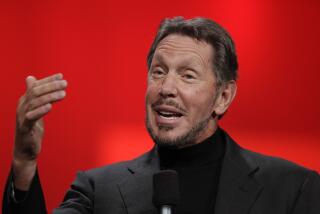The Man Who Built ABC : Television: Leonard Goldenson is presented with lifetime achievement award for role in turning the network into a communications powerhouse.
- Share via
Leonard H. Goldenson, who over 30 years built ABC from a struggling third network to a communications giant, was presented with the Academy of Television Arts & Sciences’ governors award during Sunday’s Emmy Awards telecast.
“I’m extremely proud of the fact that we were able to build an organization through the years and out of it have great morale and spirit,” he said during his acceptance speech, emphasizing ABC’s success “against all odds.”
Goldenson thanked the academy as well as presenter Ted Koppel, who anchors ABC’s “Nightline.” “It’s very nice,” he said of the recognition.
The award is given at the recommendation of the academy’s 50-member board of governors to an individual, company or organization “for outstanding achievement in the arts, sciences or management of television which is either of a cumulative nature or so extraordinary and universal in nature as to be beyond the scope of the awards presented in the categories and areas of achievement.”
Goldenson, 84, became interested in television when it was still an untapped medium. In 1951, as president of United Paramount Theaters, Goldenson was a Harvard-educated former attorney who foresaw that television would eventually be civilization’s most powerful communications tool.
His dream to expand United Paramount Theaters into television was realized when Edward Noble, a 69-year-old multimillionaire who had made his fortune in Life Savers candies, decided to sell his fledgling broadcasting network, ABC. Despite stations in five of the country’s largest cities, Noble had only lost money as he sought to gain a foothold against his two older, well-entrenched rivals, CBS and NBC.
The resulting 1953 merger, in which United Paramount Theaters paid $25 million and afforded Noble nearly 9% of the company’s stock, was somewhat of a gamble for Goldenson, who knew paying that kind of money for a company in the red would raise eyebrows.
“I must confess, at the time we started, many people discouraged me,” he said in a 1977 interview. “Our own board was quite doubtful . . . whether we could ever become a competitive force.”
Success didn’t come easily. As president of American Broadcasting-United Paramount Theaters, Goldenson played David to Goliaths NBC and CBS, which already had rounded up much of the day’s popular television talent.
“They had the (Jack) Bennys, the (Bob) Hopes, the (Arthur) Godfreys, the (Milton) Berles. All ABC had was Ozzie and Harriet,” Goldenson said in 1987. “My position was we had to . . . bring Hollywood to television.”
Goldenson is credited with being the first to bridge the competitive rift that then existed between the motion picture and television industries. In 1953, he convinced his old friend Jack Warner to set up a separate production arm for television, using shelved story ideas that weren’t being tapped for theatrical films. In 1955, viewers tuned in to “Warner Brothers Presents” Tuesday nights, which rotated three Warner productions. One of those shows, “Cheyenne,” began the trend of the television Western.
In 1954, Goldenson scored another coup: By helping the Disney studios finance a California amusement park, ABC was guaranteed an original hourlong television series from the studio. The show, like the park, was called “Disneyland,” and it became ABC’s first bona-fide hit.
In 1961, “ABC’s Wide World of Sports” helped to assure ABC’s niche in sports broadcasting, which was cemented in 1972 by 64 hours of unprecedented coverage of the Munich Olympics.
Despite its emphasis on innovative programming, by the late 1960s, ABC was still at the bottom of the network heap. Industry insiders joked that its letters stood for “Almost Broadcasting Company.” Others said, “If you want to stop the Vietnam War, put it on ABC--it’ll be over in 13 weeks.”
It wasn’t until the 1970s that ABC got the last laugh. Goldenson, who in 1972 was elected chairman and chief executive officer, began to put together a crackerjack team of managers, including programming head Fred Silverman. The same year was ABC’s first profitable one in a decade.
Then ABC began to get the ratings. Gambling in 1977 on the miniseries “Roots,” ABC attracted the largest audience that had ever watched a television program. And at the end of that season, 1976-77, seven of the Top 10 shows were from ABC. It remained the top-rated network in prime time for three years.
In January, 1986, ABC was taken over by Capital Cities (an earlier merger attempt by ITT and a takeover attempt by Howard Hughes both fell through in 1968). Goldenson was named chairman of the executive committee of Capital Cities/ABC Inc., where he remains today.
A 1987 inductee into the Television Academy Hall of Fame, Goldenson last October presented the Academy of Television Arts & Sciences Foundation, the organization’s nonprofit charitable and educational branch, with the largest contribution it has ever received: $1 million. That same month, Goldenson was elected to the new position of honorary chairman of the foundation, serving as a national policy consultant and adviser.
An academy spokesperson said that Goldenson’s governors award was in no way connected to the donation. “It is for his contributions in television, not his financial contributions,” he said.
Past recipients of the governors award have included Lucille Ball, William Hannah and Joseph Barbera, Grant Tinker, Red Skelton, Alistair Cooke, Johnny Carson, Walter Cronkite, Hallmark Cards, Inc. (for “The Hallmark Hall of Fame”), Bob Hope, William S. Paley, Elton H. Rule (also of ABC) and Sylvester (Pat) Weaver.
Accompanying Goldenson during the ceremonies Sunday were his two sisters and his daughters, Loreen Arbus and Maxine Goldenson. Goldenson’s wife, Isabelle, was recovering from knee surgery and was not in attendance.
Free - lance writer Steve Weinstein contributed to this article.
More to Read
The complete guide to home viewing
Get Screen Gab for everything about the TV shows and streaming movies everyone’s talking about.
You may occasionally receive promotional content from the Los Angeles Times.






